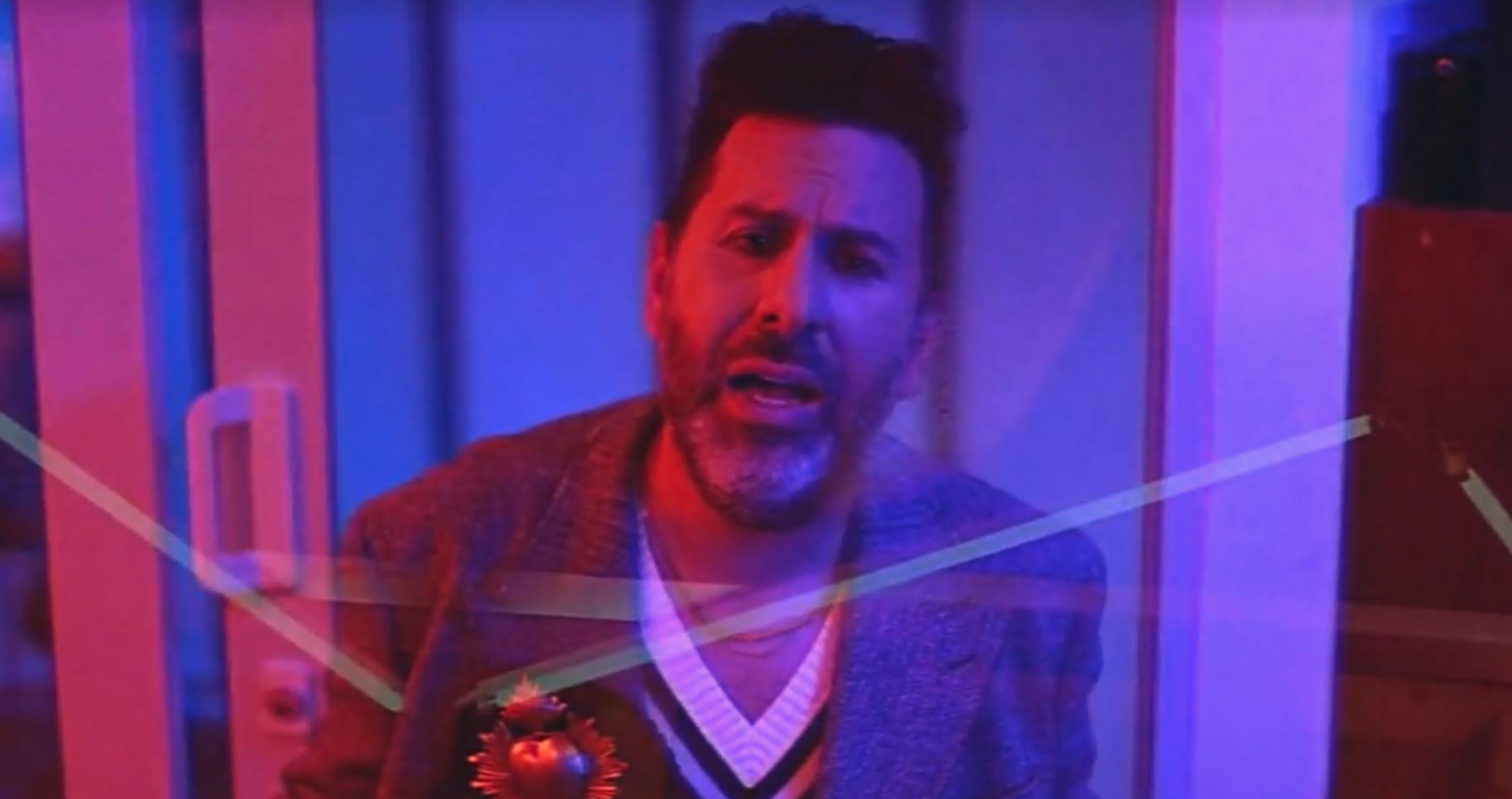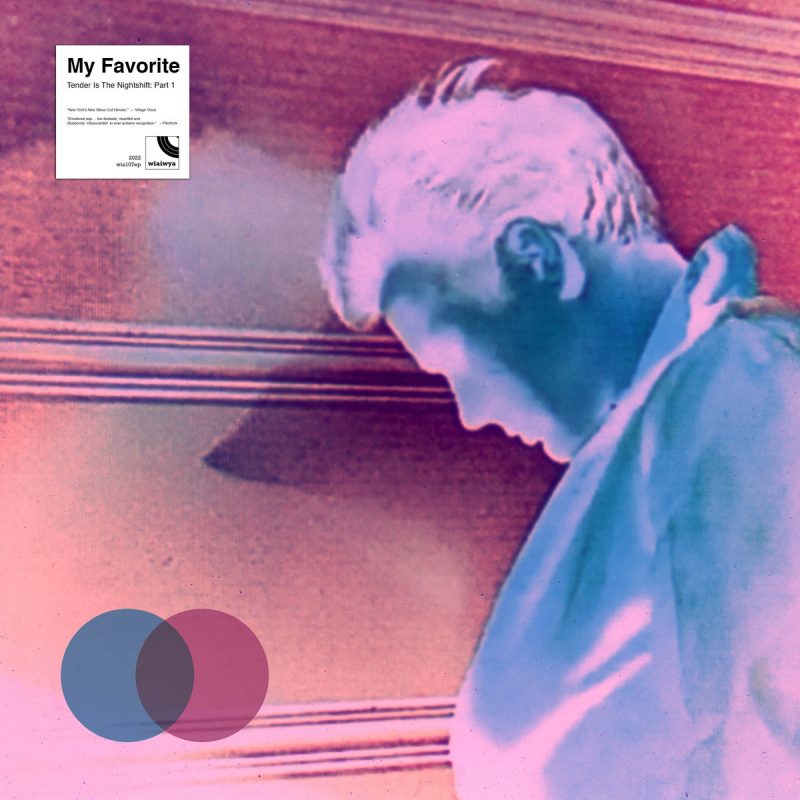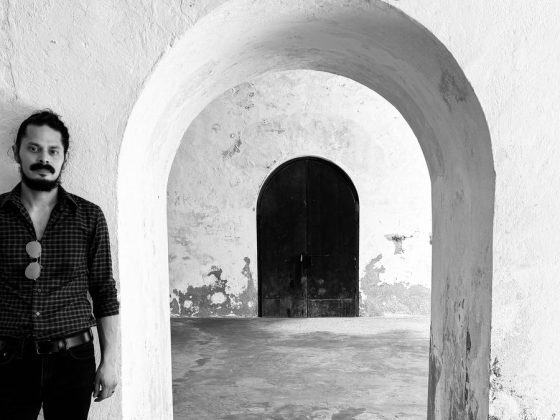If I could surf the black tide,
that’s drowning me from the inside.
I’d stagger away, with a streetwalker’s pride.
But I’m on Rockaway Beach, floating with the hollow men.
Falling through the days again.
Cult new wave/indie pop band My Favorite have had a rather benchmark year in 2022. After nearly ten years apart, the band reunited in 2014 with a handful of new recordings, and in 2022, released their first new music in six years. Tender is the Nightshift: Part One was one of my personal favorites for the year, and for those who haven’t heard it yet, the EP continues the band’s trademark combination of classic post-punk influences with shades of both Marc Almond and the cherished Sarah Records catalogue, exploring themes of loneliness and inner reflection juxtaposed over dance grooves galore. Alongside original songwriter/vocalist Michael Grace Jr. and bassist Gil Abad, the band has added vocalists Jaime Babic and Stephanie Cupo, guitarist Joe Babic and synth player Kurt Brondo from Grace’s previous band The Secret History to the lineup, ushering in a new era of the the band.
Opening Tender is the Nightshift: Part One is the epic “Dean’s 7th Dream” – an eight-minute synth pop-infused track that recalls early New Order, Chic, and The Field Mice all in one fell swoop. Chock full of romantic, nostalgic imagery, the track begins with a shuffling electronic beat, with Grace Jr., Cupo, and Babic’s vocal interplay taking center stage. Gently strummed rhythm guitar lines and clouds of soulful saxophone give way to a face-melting guitar solo courtesy of “Captain” Kirk Douglas of The Roots at the halfway mark, with a soulful vocal refrain from Grace bringing the track home.
We’re honored to premiere the video for the “Dean’s 7th Dream,” which doubles down on the song’s cinematic energy with a mix of colors, textures, and wistful performances by the band. We also had the chance to catch up with Grace Jr., who offers a few words about the video and My Favorite’s triumphant return to the spotlight. Watch and read below, and be sure to pick up a copy of Tender is the Nightshift: Part One via Bandcamp.
What were some of the influences and reference points for this video?
M: The original idea was to do a quasi-homage to Jonathan Demme’s video for New Order’s “The Perfect Kiss.” It’s been a fave of mine since I was a teenager, and I remember thinking even then how different it felt amidst all the glossy, spectacle-driven videos of the ’80s, like Duran Duran’s “Rio.” It was tense, it was cold, it was static. But even as it demystified New Order’s process, it also made it more human— and thus I think more beautiful. So that was the starting point, and the opening minute of our video— with the title card over a waveform monitor, and Kurt looking up at it while everyone else stands around awkwardly— channels a lot of those same vibes. But from there I wanted it to veer off in a few directions, engage a few symbologies more common to our practice, so to speak. Color and light, recording and recoding, and a kind of cheap Brechtian surrealism— just people and objects and words juxtaposed with minimal stagecraft. That latter approach really being a throwback to my years doing video and performance art (often as part of our live performances). So we had some DNA from Demme, and exposed it to our usual radiation to mutate it. For example, Demme featured all these closeups of hands as New Order performed, and we do too— but then as our song dissolves into pink noise and reverb, the hands begin to do different things. They start to communicate in whatever my version of a dream language is. And the difference between dreaming and being awake, between association and dissociation is an important theme of “Dean’s 7th Dream.” I like starting the video in this recording studio full of processors and monitors and wires and ending up somewhere different, without ever leaving. The way “The Perfect Kiss” forces us to be aware of the mechanics of music videos in the ’80s, I’m hoping the boring, uneasy quality of this very long video breaks our spell a bit for us, offers a refuge from the current of six-second blips of content we scroll through as if falling from a very high window. All the posing, fast cutting, lens flaring, sexless sex and moodless moods. It’s usually far more exhausting than it is compelling.
Are there other artists or filmmakers who were an influence on you?
M: There are so many, but in terms of making this— I loved how Jean-Luc Godard used fragments of text in his films, especially in his ’80s stuff like “King Lear.” I tried to do something similar by featuring disjointed bits of the lyrics in the video. I think Warhol’s willingness to embrace both tedium and variation has always stayed with me. Each of our setups in this video sort of resembles a differently colored screen print. Robert Longo and Cindy Sherman still inform the way I create across mediums. I think they both reinforce the idea that identity isn’t just fluid in an interior sense, but rather changes with every gaze focused upon us. We play all these characters in B-movies of our own design. But maybe it’s only in the hope of accidentally finding ourselves amongst them. I think my songs work in a similar way.
Let’s see, who else… I definitely thought about Derek Jarman’s layering of images. I stole at least one thing from David Lynch, and probably more. And look— it may be kind of basic to love the neon hues used by people like Michael Mann, William Friedkin, Nicolas Winding Refn, or in stuff like Blade Runner— but in my defense I hope there is something a little different, a little disorienting about using them in this lonely work space— as opposed to during a squall in some futuristic dystopia, or a Miami drug deal gone bad. No two band members ever appear together, or interact with each other. There is a real sense of isolation. Color is their only companion, and that’s a different kind of drama.
One other influence was Anne Carlisle and Slava Tsukerman’s brilliant film Liquid Sky. We actually show bits of it on the studio monitors during the video. That film (and novel) was influential in more than just formal stuff though, I liked the connections it made between sex and death, between ourselves and our doubles. It’s a great NYC art film.
There’s a VHS feel to the video, with glitches and textures added throughout. What inspired you to add those nostalgic flourishes?
M: I’ve been making little films and videos since I was in high school, and I remember always being frustrated by the VHS or Video 8 artifacts that would occur, the tracking lines and image distortion. So including them here it is a bit of a nod to those DIY days, to the feel of recording “Perfect Kiss” off the television at 1 a.m., probably taping over “Time Bandits” or something.
But there is more to it than that. I like to think about the way memory works. The constant recording and re-recording of our experiences. And memory is full of distortions, gaps, and transparencies. The things we try to erase or forget often linger in the liminal spaces between the frames. There is no clean page, and thus there is nothing ‘new.’ Art and memory are both just translucent constructs of the moments we’ve tried to move through and discard—crushed empties in a psychic landfill. There is no true opacity of the now. So some of these ideas are hopefully suggested by using the degraded, glitchy, aesthetics of analog video. And all of it mirrors the larger concepts that My Favorite has always been about. That we are not heroes, but survivors— scavengers in a wasteland of signs. We don’t live in the past so much as the past lives in us. That’s why the “retro” tag we get misses the point. Our collected hurts and harms are intermingled with all these faded flyers and cracked cassette cases. I’ve kept all the music that mattered to me, but I’ve also broken it all. So while the new EP itself might be a somewhat slick, luxury depression product, this video I think is more like a shabby, obsolete accessory you stumble upon in a secondhand shop.
How about the anime aspects? How do those factor in?
M: I wanted to create the feel that this video was taped over something, and I figured some obscure demon city nonsense from the ’80s would be a decent choice. Beyond that, the little fragments of anime create a sort of shadow narrative to what’s in the actual video. Glimpses of a city at night, of terror and trauma, of a self separated into binaries— masculine & feminine, dominant & submissive— which is a part of the theme of the song, and also mirrored in the way I am lit in the video. It’s just a way to break up the authority, the solidity of the thing.
My Favorite had such a constant line up for 10 years from 1995 to 2005. It’s great to see you make a video that features such an emphasis on your more recent collaborators.
M: When you consider our second band The Secret History had most of the same members My Favorite did, it was close to 20 years. In 2014 after the breakup of the Secret History I was in a place I hadn’t been since I was basically 16 years old— without a band. And it was difficult enough to lose Andrea Vaughn-Johnson after the first incarnation of My Favorite, and now going forward without Lisa Ronson, Darren and Todbot— it was daunting. All of those people are super-talented, irreplaceable. But it also felt like everyone needed a break. Whether from the music or each other, I’m not sure. But there really is no break for me. There is always something I want to make, something I need to make. So it ended up just me and Gil (who had been with me the whole ride) and Kurt Brondo (who had joined MF for the last couple years of the band, and was a critical part of The Secret History.) And I knew there was something special we could do in revisiting My Favorite, but I also knew it wasn’t going to be easy. Because this was also during a time when many other parts of my life were falling apart. My relationship, my mental health. It was a real crucible of sorts.
To make a long story short— those people who stood by me, stuck by me in the years that followed— when I was at my lowest— to try to remake/remodel My Favorite hold a special place in my heart. Kurt and Gil, Jamie and Joe Babic, Stephanie Cupo. They didn’t get to travel around Europe or play sold-out shows the way we had in the previous decade. They arranged songs with me in a small practice room behind a junk shop in Williamsburg. We played shows on the floor of DIY spaces for small, skeptical crowds. So it was important for me to be able to bring them back last fall to make this video, to create a document of those few years that maybe weren’t quite golden, but which in their own way— saved my life. They were the crew that helped create this EP that I am really proud of. In addition to that, I got to work again with “Captain” Kirk Douglas, who was in the first incarnation of My Favorite, at 19 years old, long before he’d become the legit guitar hero he is today with The Roots. Him playing on this single, being a part of this video really brought it all full circle. Everything old was new again, for a night
or two.
You’ve said “Dean’s 7th Dream” is a particularly important song to you. Why?
M: Well it must be! I mean it takes some chutzpah to have our comeback single be an 8 ½ minute funk track. Seriously though— it is important to me. It tells a story I’ve needed to tell for a while, and asks some questions that I think deserve answers. But I also knew that when you go to the deep, dark places— bring a light. So there is a lot of ecstasy in it also. A lot of different parts Kurt and I welded together onto Sad Max’s death mobile. An open E chord from Tears for Fears, a bit of saxophone from “Modern Love,” a brittle groove from Chic, a breathy break from New Order. I brought a lot of my friends down into the caves with me and well… a disco broke out.
Why does post-punk still matter in 2023? Why does it matter to you?
M: I mean I love a lot of different music, but the music of the post-punk period absolutely changed my life and became the template for My Favorite. And I think what I found so exciting about that era was how breathlessly punk evolved to incorporate so many disparate sounds and styles and ideas. Electronic music, reggae, soul, folk, psychedelia. Anything and everything was possible. It was more about the spirit, the sense that you could be who you wanted to be, and say what you needed to say. And that sense of freedom, of change, of ambiguity was something I really tried to make central to My Favorite. And one of the things I really like about post-punk.com, is that you guys feature a lot of artists who expand and enrich our understanding of what post-punk really is. Including a few that some gloomy gatekeepers might balk at. But they are getting it all wrong. There are so many new bands I really love, but at the risk of sounding like a typical Gen X grouch, there is some stuff I don’t really think is all that interesting. A certain reduction of post-punk into a pretty empty set of tropes. A minor chord progression, a dark bass sequencer, a skinny white dude in bondage gear and some dry ice. I mean I dig it, but it’s only a part of what it can be, what it can mean. Capitalist culture, social media, technology are all designed to push everything truly poetic or transgressive through a meat grinder. Until it all looks, sounds, tastes the same. It makes everything easier to sell, but harder to keep. So if what we did with this song, this video, this EP seems somewhat convoluted or mystifying— it’s by design. I want our art to take a form so ornate, so grotesque, so intentional as to jam up and halt the teeth of those gears. Create a little space to hear and feel something else.
















 Or via:
Or via: